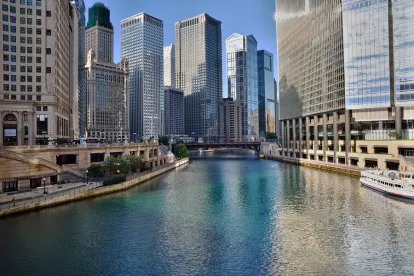Illinois, Chicago, and Cook County have issued new guidance and restrictions as COVID-19 cases continue to rise around the country.
Governor J.B. Pritzker has announced an update the state reopening plan. The City of Chicago has updated its quarantine order for travelers from high-incidence states and announced the reinstatement of certain restrictions on businesses. Suburban Cook County has issued travel guidance mirroring Chicago’s quarantine order.
State Updates
The Governor announced an update to the Restore Illinois reopening plan on July 15. The plan divides the state into 11 health regions and provides a tiered mitigation approach if cases of COVID-19 in the state continue to rise.
The City of Chicago and suburban Cook County are now in separate regions. The North Suburban region includes Lake and McHenry County. The West Suburban region includes DuPage and Kane County. The South Suburban region includes Kankakee and Will County. The rest of the state is divided into the North, North-Central, West-Central, Metro East, Southern, and East-Central regions.
The state will consider implementing mitigation actions outlined in the reopening plan if a region experiences:
-
Three consecutive days averaging greater than or equal to an eight-percent positivity rate; or
-
A sustained increase in positivity rate over a seven-day rolling average and either:
(a) A sustained seven-day increase in hospital admissions for COVID-19-like illness; or
(b) A reduction in hospital capacity threatening surge capabilities (ICU capacity or medical/surgical beds under 20 percent).
It is unclear how the mitigation procedures will be implemented or if additional mitigation actions will be considered.
The mitigation options (Tier 1 is the least restrictive; Tier 3 is the most restrictive) are listed by industry or activity, including:
-
Bars and restaurants
-
Hospitals
-
Meetings, social events, and religious gatherings
-
Offices
-
Organized group recreational activities, gyms, and fitness centers
-
Retail
-
Salons and personal care
In Tier 1, offices may be required to institute remote work for high-risk individuals and continue to emphasize telework for as many workers as possible. Meetings, social events, and religious gatherings may have additional limits imposed. Bars and restaurants may need to reduce indoor dining capacity.
In Tier 2, offices may be required to reduce capacity, with recommendations to resume remote work. Retailers may have to suspend in-person non-essential retail and make online and curbside pick-up available. Bars and restaurants may need to suspend indoor dining and bar service.
In Tier 3, offices may be required to institute remote work for all non-essential workers. All non-essential retail may be suspended. Bars and restaurants may suspend in-person dining.
Chicago Quarantine Order, Restrictions on Businesses
The Chicago Department of Public Health has issued an Emergency Travel Order requiring travelers entering or returning to Chicago from states with an average COVID-19 case rate greater than 15 new cases per 100,000 residents to quarantine for 14 days or the duration of their stay in Chicago, whichever is shorter. The order applies only to individuals who have spent more than 24 hours in a designated state.
During the quarantine period, individuals must not be in public or otherwise leave their selected dwelling, unless to seek medical care or COVID-19 testing. If seeking medical care or testing, or when traveling to or from the airport, train station, or bus station upon arrival or departure, individuals subject to the order must wear a face covering and must not use public transportation.
The FAQs associated with the order state that “essential workers” are not subject to the mandatory self-quarantine if they are:
-
A non-resident of Chicago, are traveling from a designated state to Chicago for the primary purpose of carrying out their primary work in Chicago, and need to be physically present in Chicago to carry out that primary work; or
-
A resident of Chicago, are returning from a designated state, were in the designated state for the primary purpose of carrying out their primary work in that state, and needed to be physically present in that state to carry out that primary work.
“Essential worker” is a person who works in critical infrastructure, as designated by the Cybersecurity and Infrastructure Security Agency. The definition also includes any state, local, and federal officials and employees traveling in their official capacities on government business, including military service. However, an essential worker whose travel was for non-work purposes is subject to the mandatory self-quarantine and is not covered by this exception.
Other exceptions to the order for personal travel also will be permitted for travel related to medical care or parental shared custody arrangements. Additionally, the Commissioner of Health may grant an exemption based upon an organization’s or business’s testing and other control policies, or in certain extraordinary circumstances, subject to terms and conditions imposed by the Commissioner in the interest of public health. The process for obtaining such an exemption is unclear.
The states originally covered by the order included:
-
Alabama
-
Arizona
-
Arkansas
-
California
-
Florida
-
Georgia
-
Idaho
-
Louisiana
-
Mississippi
-
Nevada
-
North Carolina
-
South Carolina
-
Tennessee
-
Texas
-
Utah
Twelve days later, the list was updated to include Iowa and Oklahoma because increasing rates of COVID-19 cases in those states. Kansas was added on July 21. The list will be updated every Tuesday, with changes going into effect on the following Friday.
Additionally, the City of Chicago has announced reinstatement of certain restrictions in light of an uptick in COVID-19 cases in Chicago and surging COVID-19 activity in other states. The following restrictions will go into effect on July 24, at 12:01 a.m.:
-
Bars, taverns, breweries, and other establishments that serve alcohol for on-site consumption without a retail food license will no longer be able to serve customers indoors.
-
Restaurants that serve alcohol will be allowed to continue to operate as long as they abide by ongoing COVID-19 guidance and existing regulations.
-
Establishments that do not serve food may still provide outdoor service as they did during Phase Three of the City’s reopening plan.
-
-
Maximum party size and table occupancy at restaurants, bars, taverns, and breweries will be reduced to six people.
-
Indoor fitness class size will be reduced to a maximum of 10 people.
-
Personal services requiring the removal of face coverings, such as shaves and facials, will no longer be permitted.
-
Residential property managers will be asked to limit guest entry to five per unit to avoid indoor gatherings and parties.
Cook County Department of Public Health Travel Guidance
The Cook County Department of Public Health issued travel guidance directing travelers to suburban Cook County coming from 17 COVID-19 hotspots to quarantine for 14 days following their last contact with the identified state. The guidance excludes the City of Evanston and Village of Skokie.
Because the travel guidance for suburban Cook County defines high-incidence states in the same way as the Chicago Emergency Travel Order, the respective lists of designated states are the same.
While the suburban Cook County guidelines appear to mirror those implemented by the City of Chicago, the FAQs issued by the Cook County Department of Public Health state that, unlike the City of Chicago, suburban Cook County’s travel guidance is only a recommendation, not an order. The Cook County Department of Public Health will not be issuing fines or enforcing the guidance. The Department’s dedicated webpage provides additional information relating to this guidance.
Reopening orders contain extensive requirements creating compliance issues that can vary significantly depending on the specific state or local jurisdiction.




 />i
/>i

